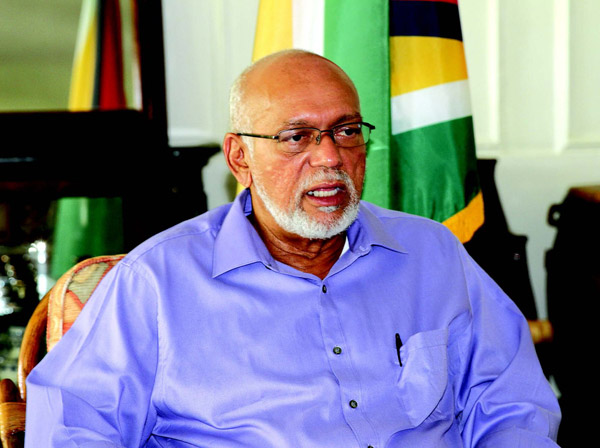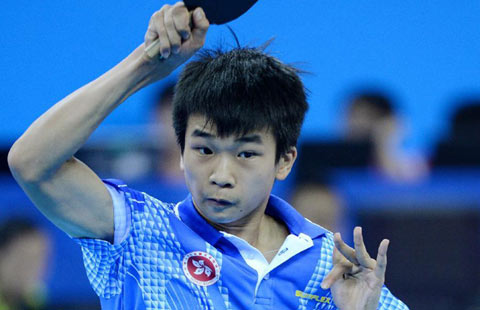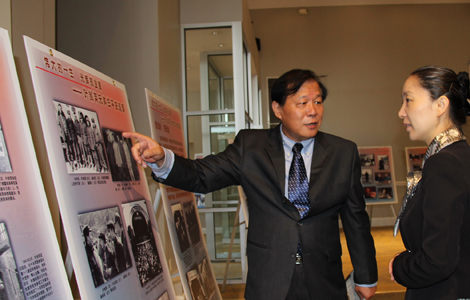Guyana-China ties have deep roots
Updated: 2014-08-25 06:29
By Ji Ye and Chen Weihua in Rio de Janeiro(China Daily Latin America)
|
||||||||
 |
|
Donald Ramotar, president of Guyana, said that partnerships in development projects with China would help not only his country but the Latin American region as a whole. [CHEN WEIHUA / XINHUA] |
An admirer of China, 64-year-old Guyanese President Donald Ramotar has many China-related publications on the his private bookshelves, including the recently published English edition of Seeking Truth, a political theory periodical published by the Central Committee of the Communist Party of China. He is also a regular reader of China Daily online.
As head of state, Ramotar hopes that more and more Chinese companies will come to Guyana and lead the development of various fields such as infrastructure, electric power and telecommunications, among others.
"Although Guyana and China are separated by vast distances, there were already Chinese immigrants in Guyana as early as the 18th century," Ramotar said in an interview at his presidential palace.
Ramotar showed great familiarity when talking of the close relations between Guyana and China, which have a long and well established history.
In the middle of 18th century, the first Chinese arrived in what was then known as British Guiana to work as indentured laborers on the British colony's sugar plantations.
With Guyana's independence in 1966, steps were soon taken to promote ties between the two nations:
In 1971, Guyana voted to support the recognition of the People's Republic of China as the true representative of the Chinese people at the United Nations. And in 1972, Guyana became the first English-speaking Caribbean country to recognize the People's Republic of China.
Ramotar said that over the decades that followed, the territory's ethnic Chinese population migrated into other sectors and became a key component of the country's economic development and ethnic mix.
Today, after years of friendship and cooperation, bilateral relations continue to flourish as China begins to play a key role in the region and its investments transform the South American nation.
During Chinese President Xi Jinping's Latin America tour in July, he and leaders from the Community of Latin American and Caribbean States (CELAC) jointly announced the decision to establish the China-CELAC Forum and to hold its first ministerial meeting in Beijing soon.
The China-CELAC Forum is "extremely important" for Latin America and the Caribbean, and is likely to be very fruitful, Ramotar said recalling the meeting that was held in Brasilia.
"China has shown a great desire to be a real partner and genuine interest in developing the capacity of the people of Latin America and the Caribbean. So we see this new development and initiative as extremely important and most welcome for the people of this region," he said.
Ramotar lauded the traditional friendship and sound relations between China and Guyana, reaffirming that the Guyanese government has always adhered to the one-China policy.
He added that China and Guyana are also conducting "very important economic cooperation".
"Many Chinese companies invest in Guyana and we have a very close relationship with the Chinese government, which is helping us deal with many of our issues, particularly infrastructure issues that we are working on at this point in time," Ramotar said.
China has been steadily making its presence known in Guyana by supporting major infrastructure projects while the Government of Guyana has embraced Chinese contractors for major tax payer-funded projects.
According to the government information agency of Guyana, relations with China have benefited Guyana socially and economically with a number of key projects, like the One Laptop per Family (OLPF) initiative, the Amaila Falls Hydroelectric Project, renovation of Cheddi Jagan International Airport and the construction of a world-class Marriott hotel.
In health, Guyana is the only South American country to have an agreement with China and receives frequent medical missions.
Guyana has vast forests and abundant mineral and water resources, but relatively backward infrastructure restricts the further development of Guyana. Ramotar called for the continuation of China's support for the development of Guyana and reiterated his welcome to prospective Chinese investors and partners.
"Many Chinese companies prefer the rich resources in Guyana and invest in our country. We are urgently needing to improve the infrastructure, so we look forward to more and more Chinese companies coming to Guyana," said Ramotar.
The cooperation with China also includes human resources and cultural exchanges, including a new Confucius Institute and Guyanese universities holding Chinese language classes, according to him.
Ramotar also hopes to build on the success in the future, believing much more can be done in terms of cooperation, not only in culture, but in such areas as agriculture and infrastructure.
Ramotar stressed that investment from China will benefit not only Guyana but all of the whole region.
"Latin America and the Caribbean can join hands with China to achieve a win-win situation," Ramotar said.
Contact the writers at jiye@chinadaily.com.cn and chenweihua@chinadailyusa.com

 Quake rocks California wine country, 120 injured
Quake rocks California wine country, 120 injured
 Bao Bao, blessed with many birthday wishes
Bao Bao, blessed with many birthday wishes
 Heartbreaking partings for 'left-behind children'
Heartbreaking partings for 'left-behind children'
 Yao Ming takes on Ice Bucket Challenge
Yao Ming takes on Ice Bucket Challenge
 Luxury automobile expo held in Beijing
Luxury automobile expo held in Beijing
 YOG: Mixed intl team semifinal of table tennis
YOG: Mixed intl team semifinal of table tennis
 Exhibit explores Marshal Ye's legacy
Exhibit explores Marshal Ye's legacy
 The tiara club
The tiara club
Most Viewed
Editor's Picks

|

|

|

|

|

|
Today's Top News
Calif. governor declares emergency from quake
American held in Syria freed
Washington DC seeks more Chinese tourism
California hospital treats 70 plus after quake
White House aides to attend funeral of black teen
Man, 18, accused of being mastermind in imam's murder
China urges US to stop close-in surveillance
US seeks multi-prong strategy against ISIL forces
US Weekly

|

|







